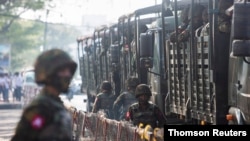Nearly five months since Myanmar’s military took control of the country, the “Spring Revolution” has sparked nationwide demonstrations and a crackdown that’s cost hundreds of lives.
But the armed forces haven’t limited themselves to smashing protesters. They’ve gone after journalists reporting on them, too.
Mratt Kyaw Thu, 31, is one who managed to escape. Mratt Kyaw Thu fled to Madrid after months on the run. An open critic of the junta, he is one of thousands who are wanted by the armed forces.
Now he finds the continued crackdown hard to watch.
“I’m feeling so depressed. I’ve been crying all day, I don’t know what to do,” he told VOA in a June phone interview.
Myanmar’s military, the Tatmadaw, has used the country’s penal code law to target anyone who interferes with government operations. Those found guilty face years in jail.
Mratt Kyaw Thu said that the threat of jail never concerned him. But the fear of being picked up and tortured in detention was too much.
“It’s really common for military to torture overnight and call the family member to take the dead body in the morning,” he told VOA.
The military has detained thousands since the February 1 coup, including multiple members of the media. Freed U.S. editor Nathan Maung recently spoke of his ordeal – including being beaten, interrogated and deprived of food and water – while U.S. journalist Danny Fenster remains in Yangon’s Insein Prison.
Mratt Kyaw Thu decided to leave Myanmar after he saw grotesque images of a National League for Democracy (NLD) politician who had been tortured and killed.
“[In] the pictures, the military tortured him, they even poured hot water down his throat … his tongue and his eyes come out from his face. That picture shocked me a lot,” he said.
The freelancer has been a journalist for over a decade. Mratt Kyaw Thu won Agency France Press’s Kate Webb Award in 2017 for his coverage of the Rohingya genocide.
After the military shut down the internet, he worked to report factual information undistorted by pro-military groups. But the junta, officially the State Administrative Council (SAC), quickly denounced his work.
“I think February 12 they announced my name as fake news,” he said.
His name came further to attention of the junta following a March interview he conducted with a general who had defected and joined the Civil Disobedience Movement (CDM), a pro-democracy campaign that has seen thousands of workers go on strike.
An altercation during protests in Yangon chilled him.
“Two policemen just emerged, appeared in front of me, pointed with their guns [and said], ‘If you are not a protester just go away, I don’t want to shoot you.’ This is the moment I was very distraught, very fearful.”
“They were ready to shoot someone against them. It was a terrible, horrible, experience,” he said.
In another incident, Mratt Kyaw Thu said he was inside a friend’s apartment when “even sound grenades and gunfire hit my wall.” He said he risked being shot were he to observe from the balcony.
At one point, the Myanmar military's 77th Light Infantry Division (LID) – known for violence during previous uprisings in the country – showed up on the street where he lived. Human Rights Watch accused the division of firing at protesters in 2007.
Mratt Kyaw Thu eventually left Yangon after hiding in an “escape area” with rebel ethnic armed groups. On April 5, the military announced an arrest warrant for the then-on-the-run journalist. Mratt Kyaw Thu had been hiding in villages near the border while dodging nearby airstrikes.
“The whole village had to move, had to flee into the forest. They have to leave their houses, and it was a very tragic event for them,” he said.
Mratt Kyaw Thu was able to obtain a visa for Spain. He first tried for asylum in Germany at a stopover in Frankfurt. But he was refused entry under European Union regulations governing asylum seekers.
For 38 days, Mratt Kyaw Thu was kept within a Frankfurt Airport detention center with little to do and no contact with the outside world.
Because of COVID-19 restrictions, “I couldn’t even talk to people,” he said. Mratt Kyaw Thu finally was released and arrived in Spain on June 1.
Although safe, Mratt Kyaw Thu admits he’s struggling to adapt. And there are regrets.
“I can have coffee, go out shopping. At the same time, a lot of people are dying in my country, risking their lives. I’m sitting doing nothing; I feel so guilty,” he said.
Mratt Kyaw Thu continues to fact-check and report about Myanmar’s dire situation on his social media accounts. On Facebook, he has a following of more than 495,000 followers combined.
He’s under no illusions about the prospect of returning.
“As long as the dictator, Min Aung Hlaing, is in the chair, in power, I cannot go back,” Mratt Kyaw Thu said. “I’m a fugitive forever.”
General Min Aung Hlaing has led the Tatmadaw for a decade and is de facto ruler since disputing election results in November 2020 and jailing members of the government, including State Counselor Aung San Suu Kyi.
The general has been sanctioned in recent years by the United States and Britain for abuses of ethnic minorities in Myanmar.





